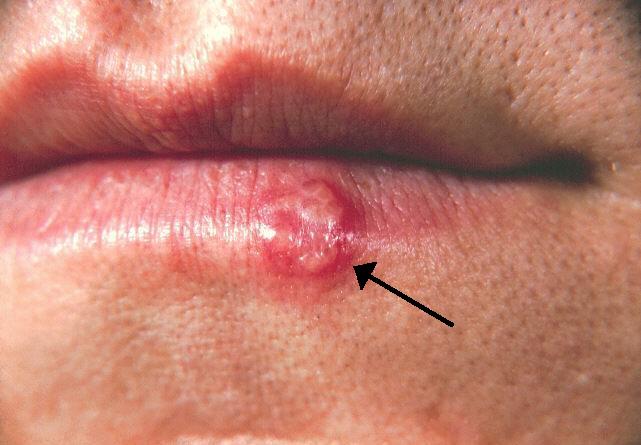Cold sore
(Redirected from Fever blisters)
Editor-In-Chief: Prab R Tumpati, MD
Obesity, Sleep & Internal medicine
Founder, WikiMD Wellnesspedia &
W8MD medical weight loss NYC and sleep center NYC
| Cold sore | |
|---|---|

| |
| Synonyms | Fever blister, oral herpes, herpes labialis |
| Pronounce | N/A |
| Specialty | N/A |
| Symptoms | Blisters, itching, pain, tingling |
| Complications | Herpetic whitlow, herpes simplex encephalitis, herpes simplex keratitis |
| Onset | 2–12 days after exposure |
| Duration | 7–10 days |
| Types | N/A |
| Causes | Herpes simplex virus (HSV-1, sometimes HSV-2) |
| Risks | Stress, fatigue, sunburn, fever, menstruation |
| Diagnosis | Physical examination, viral culture, PCR |
| Differential diagnosis | Aphthous stomatitis, impetigo, angular cheilitis |
| Prevention | Avoiding triggers, sunscreen, antiviral medication |
| Treatment | Antiviral drugs (e.g., acyclovir, valacyclovir) |
| Medication | N/A |
| Prognosis | N/A |
| Frequency | Common |
| Deaths | Rare |
Cold sore (also known as herpes labialis) is a type of infection caused by the herpes simplex virus (HSV). There are two types of HSV: HSV-1 and HSV-2. Cold sores are most commonly caused by HSV-1.
Causes[edit | edit source]
Cold sores are caused by the herpes simplex virus. Most cold sores are caused by the HSV-1 strain, although the HSV-2 strain, typically associated with genital herpes, can also cause them. The virus is highly contagious and can be transmitted through direct contact with the sores or even with the saliva of an infected person.
Symptoms[edit | edit source]
The primary symptom of a cold sore is a painful blister on the lip or around the mouth. Before the blister appears, the person may experience tingling, itching, or burning in the area. The blister will eventually break, leak a clear fluid, and then crust over. Cold sores typically heal within two weeks without leaving a scar.
Treatment[edit | edit source]
While there is no cure for the herpes simplex virus, there are treatments available to manage the symptoms of a cold sore. Antiviral medication can help to speed up the healing process, reduce the frequency of outbreaks, and lower the risk of transmitting the virus to others. Over-the-counter treatments can also help to alleviate the pain and discomfort associated with cold sores.
Prevention[edit | edit source]
Prevention methods for cold sores include avoiding direct contact with the sores or saliva of an infected person, not sharing personal items like toothbrushes or lip balm, and using a lip balm with sun protection factor (SPF) to protect the lips from the sun, as exposure to sunlight can trigger an outbreak.
See also[edit | edit source]
Search WikiMD
Ad.Tired of being Overweight? Try W8MD's physician weight loss program.
Semaglutide (Ozempic / Wegovy and Tirzepatide (Mounjaro / Zepbound) available.
Advertise on WikiMD
|
WikiMD's Wellness Encyclopedia |
| Let Food Be Thy Medicine Medicine Thy Food - Hippocrates |
Translate this page: - East Asian
中文,
日本,
한국어,
South Asian
हिन्दी,
தமிழ்,
తెలుగు,
Urdu,
ಕನ್ನಡ,
Southeast Asian
Indonesian,
Vietnamese,
Thai,
မြန်မာဘာသာ,
বাংলা
European
español,
Deutsch,
français,
Greek,
português do Brasil,
polski,
română,
русский,
Nederlands,
norsk,
svenska,
suomi,
Italian
Middle Eastern & African
عربى,
Turkish,
Persian,
Hebrew,
Afrikaans,
isiZulu,
Kiswahili,
Other
Bulgarian,
Hungarian,
Czech,
Swedish,
മലയാളം,
मराठी,
ਪੰਜਾਬੀ,
ગુજરાતી,
Portuguese,
Ukrainian
Medical Disclaimer: WikiMD is not a substitute for professional medical advice. The information on WikiMD is provided as an information resource only, may be incorrect, outdated or misleading, and is not to be used or relied on for any diagnostic or treatment purposes. Please consult your health care provider before making any healthcare decisions or for guidance about a specific medical condition. WikiMD expressly disclaims responsibility, and shall have no liability, for any damages, loss, injury, or liability whatsoever suffered as a result of your reliance on the information contained in this site. By visiting this site you agree to the foregoing terms and conditions, which may from time to time be changed or supplemented by WikiMD. If you do not agree to the foregoing terms and conditions, you should not enter or use this site. See full disclaimer.
Credits:Most images are courtesy of Wikimedia commons, and templates, categories Wikipedia, licensed under CC BY SA or similar.
Contributors: Prab R. Tumpati, MD


